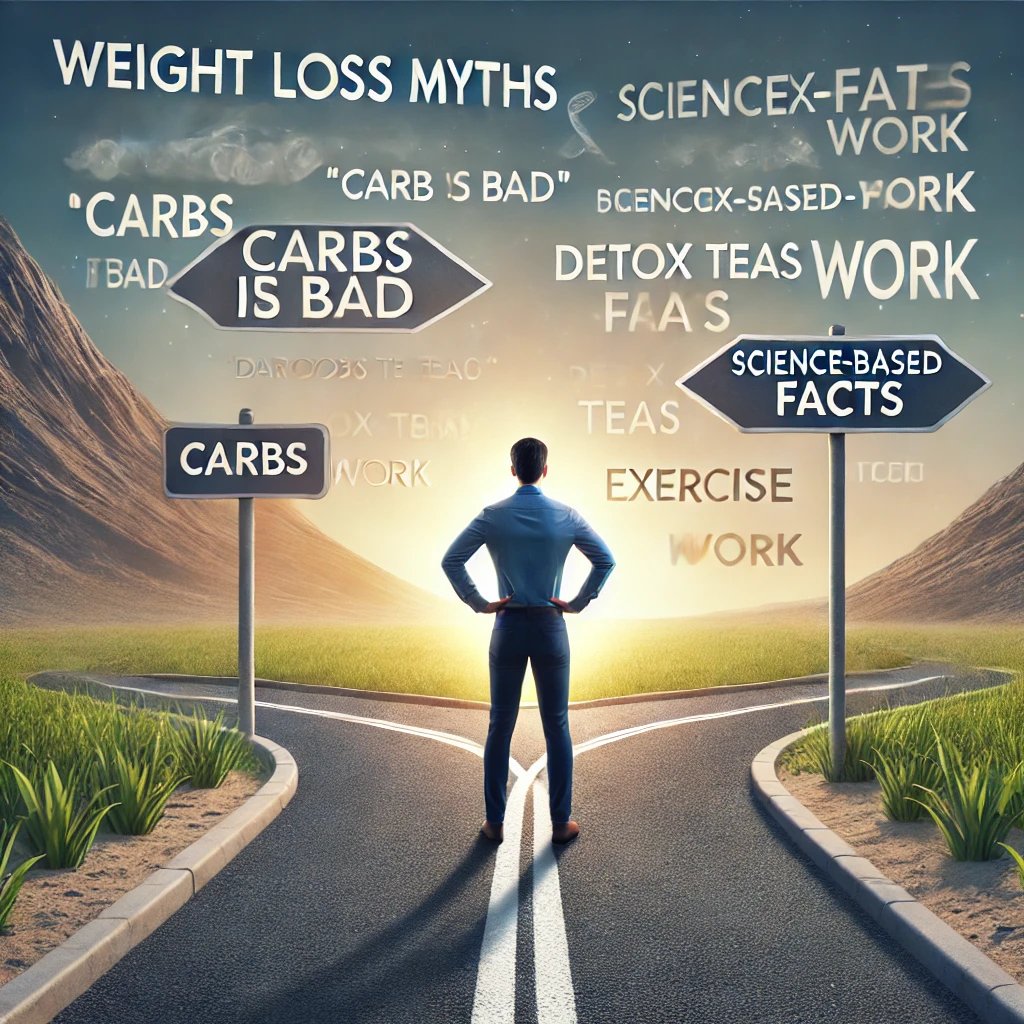Introduction
Weight loss is a journey filled with conflicting advice, fad diets, and misinformation. Many people fall victim to common myths that can hinder progress or even harm their health. Understanding the truth behind these misconceptions is essential for achieving sustainable weight loss. This guide debunks some of the most common weight loss myths and provides science-backed facts to help you make informed decisions.
Common Weight Loss Myths and the Truth Behind Them

1. Myth: Skipping Meals Helps You Lose Weight
Truth: Skipping meals can slow down metabolism and lead to overeating later in the day. Regular, balanced meals help maintain steady energy levels and promote a healthier metabolism.
2. Myth: Carbs Are the Enemy
Truth: Not all carbs are bad. Whole grains, fruits, and vegetables provide essential nutrients and fiber, which aid digestion and keep you full. The key is to avoid refined carbs and sugary foods.
3. Myth: Fat Should Be Completely Avoided
Truth: Healthy fats, such as those found in avocados, nuts, and olive oil, are essential for brain function, hormone regulation, and satiety. Avoiding trans fats and processed fats is more important than eliminating all fats.
4. Myth: You Need to Exercise Excessively to Lose Weight
Truth: While exercise is crucial for overall health, weight loss primarily depends on a balanced diet and calorie intake. A combination of moderate exercise and mindful eating yields the best results.
5. Myth: Eating Late at Night Causes Weight Gain
Truth: Weight gain is determined by total calorie intake and expenditure, not the time of day you eat. However, late-night snacking on unhealthy foods can contribute to excess calorie consumption.
6. Myth: Detox Teas and Supplements Help Burn Fat
Truth: Most detox teas and weight loss supplements have no scientific backing and may even be harmful. Sustainable weight loss comes from a balanced diet, hydration, and regular exercise.
7. Myth: Crash Diets Lead to Long-Term Weight Loss
Truth: Rapid weight loss from crash diets is often due to water loss and muscle depletion rather than fat loss. These diets are unsustainable and can lead to weight regain once normal eating resumes.
8. Myth: You Can Target Fat Loss in Specific Areas
Truth: Spot reduction is a myth. Fat loss occurs throughout the body based on genetics and overall calorie deficit. Strength training and a balanced diet help tone specific areas but won’t target fat loss in one spot.
9. Myth: Healthy Food is Always Expensive
Truth: Eating healthy doesn’t have to be costly. Whole foods like lentils, eggs, oats, and frozen vegetables are affordable and nutritious options that support weight loss.
10. Myth: More Protein Always Equals More Muscle and Fat Loss
Truth: While protein is essential for muscle repair and satiety, excessive protein intake doesn’t automatically result in fat loss. A well-balanced diet with proper macronutrient ratios is key.
How to Approach Weight Loss the Right Way
1. Focus on a Balanced Diet
Incorporate whole, unprocessed foods, lean proteins, healthy fats, and complex carbohydrates for long-term health and weight management.
2. Stay Active
Engage in a mix of cardio, strength training, and flexibility exercises to support overall fitness.
3. Prioritize Sleep and Stress Management
Lack of sleep and high stress levels can lead to weight gain and poor dietary choices. Aim for at least 7-9 hours of sleep and incorporate stress-reducing activities.
4. Hydrate Properly
Drinking enough water aids digestion, boosts metabolism, and helps control hunger.
5. Set Realistic Goals
Sustainable weight loss takes time. Focus on gradual progress rather than quick fixes.

Conclusion
Weight loss myths can create confusion and make it harder to achieve sustainable results. By understanding the truth behind these misconceptions, you can adopt healthier habits that lead to long-term success. Focus on balanced nutrition, regular exercise, and mindful lifestyle choices to achieve and maintain a healthy weight.





